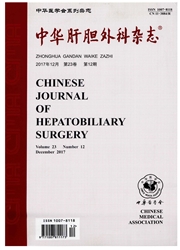

 中文摘要:
中文摘要:
目的通过观察活体或冷保存期离体门静脉灌注供肝转染白细胞介素-1受体相关激酶-4(IRAK-4)特异短发夹RNA(shRNA)对再灌注后受体TNF-α产生的影响,判断以IRAK-4为肝移植缺血再灌注损害(I/RI)治疗靶点的可行性并探索可行的shRNA治疗途径.方法雄性SD大鼠,随机分为冷缺血转染组、活体转染组、对照组,以两袖套法建立同种异体肝移植模型.冷缺血转染组于冷缺血期经门静脉灌注转染携带染IRAK-4-shRNA的转染质粒pSIIRAK-4;活体转染组在门静脉袖套吻合完成后,经门静脉分支注入pSIIRAK-4;对照组不予任何处理.按门静脉血流恢复后第0 min、60 min及180 min分为三个亚组,逆转录-聚合酶链式反应及蛋白免疫印记法测定肝组织的染IRAK-4 mRNA和蛋白表达水平;酶连免疫吸附法检测肝组织NF-κB活性及血清TNF-α含量.结果再灌注后活体转染组、对照组的IRAK-4蛋白与mRNA表达水平、NF-κB活性以及TNF-α含量均高于冷缺血转染组(P<0.01);冷缺血转染组的IRAK-4表达明显抑制,再灌注后各时点差异无显著性(P>0.05).结论以IRAK-4为靶点的冷缺血shRNAs转染途径能有效减轻肝移植时的I/RI,但能否以IRAK-4作为预防其他器官的I/RI的治疗靶点尚需深入研究.
 英文摘要:
英文摘要:
Objective To investigate the changes of TNF-α in reperfusion host received graft liver transfected with short hairpin RNA (shRNA) targeting Interleukin 1 receptor associated kinase-4 (IRAK-4) gene through portal vein during cold ischemia period or in vivo after portal vein was inosculated to explore effective gene therapy approach and the possibility of IRAK-4 as genetherapy target for liver ischemia/reperfusion injury (I/RI). Methods Sprague-Dawley rats were divided into three groups: the control group, the in vivo transfection group (IVT group) and the cold ischemia transfection group (CIT group). The orthotopic liver transplantation were perfoumed by two-cuff method. The rats in CIT group were perfused with IRAK-4-shRNA plasmid (pSIIRAK-4) during cold ischemia period, those in IVT group received the equivalent volumes (2ml) of pSIIRAK-4 after portal vein inosculated and the control group leaved without any treatment. At 0, 60 and 180 min after reperfusion, the expression of IRAK-4 gene and protein level were determined by RT-PCR and Western blot. The activities of NF-κB and the serum TNF-α level were detected by ELISA. Results After reperfusion, all the indexes were significantly higher in IVT group and the control group than CIP group (P 〈 0.01). However, the expression of IRAK-4 was significantly depressed in CIT group and the difference was not significant at different time phases after reperfusion (P 〉 0.05). Conclusion The depression of IRAK-4 expression with IRAK-4-shRNA through portal vein perfusion during cold ischemia period can effectively protect against graft hepatic I/RI. However, the problem of whether IRAK-4 could be the ideal gene therapy target for I/RI of other organs needs to be further studied.
 同期刊论文项目
同期刊论文项目
 同项目期刊论文
同项目期刊论文
 Glycine blunts transplantative liver ischemia-reperfusion injury by downregulating interleukin 1 rec
Glycine blunts transplantative liver ischemia-reperfusion injury by downregulating interleukin 1 rec The effects of SOCS-1 on liver endotoxin tolerance development induced by a low dose of lipopolysacc
The effects of SOCS-1 on liver endotoxin tolerance development induced by a low dose of lipopolysacc 期刊信息
期刊信息
